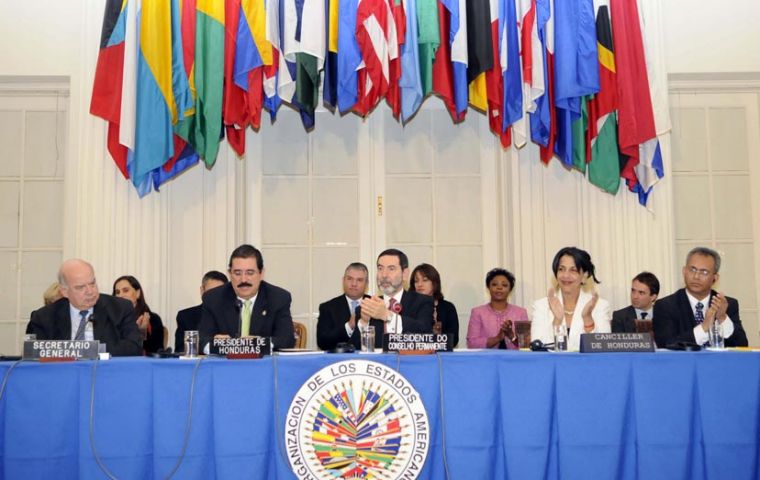MercoPress. South Atlantic News Agency
OAS agrees to let Cuba back in, but initiative rests on Havana
 “The Cold War is over”, said Honduran President Manuel Zelaya. A more reflective Celso Amorim from Brazil said OAS decision shows “common sense is still alive”.
“The Cold War is over”, said Honduran President Manuel Zelaya. A more reflective Celso Amorim from Brazil said OAS decision shows “common sense is still alive”. The Organization of American States, OAS, lifted its 47-year suspension of Cuba on Wednesday following a consensus agreement which contemplated Washington’s position and those of the Havana regime supporters who wanted a return with no conditions.
The 34-member hemispheric body, meeting in Honduras, unanimously and by acclamation scrapped a 1962 decision at the height of the Cold War that barred Cuba as revolutionary leader Fidel Castro took it toward communism and an alliance with the Soviet Union.
The administration of US President Barack Obama has taken steps toward a more open relationship with Cuba, lifting restrictions on travel and remittances to Cuba for Cuban-Americans with relatives on the island.
Regarding the Cuban issue, the Obama administration has said Havana should be allowed to return to the OAS if it complies with democratic responsibilities such as releasing political prisoners and makes progress on human rights.
However Havana’s staunchest allies instead called for Cuba to be allowed back in from the cold with no conditions, and Secretary of State Hillary Clinton came under heavy pressure at the OAS meeting. In effect she left for Egypt on Tuesday without having reached a consensus on the issue.
On Monday she participated in the taking office of the new Salvador president Mauricio Funes who’s first decision was the resumption of diplomatic relations with Cuba interrupted for decades, leaving the United States as the only country in the hemisphere with no normalized links with Havana.
But in a last minute diplomatic compromise, the group's member countries agreed that Cuba's re-entry would be “the result of a process of dialogue begun at the request of the Cuban government and in line with the practices, purposes and principles of the OAS”, a direct reference to the organization's stated mission to defend democracy and human rights in the Western Hemisphere.
“We removed a historical impediment to Cuba's participation in the OAS, but also established a process of engagement with Cuba” US Assistant Secretary of State Thomas Shannon said.
“The Cold War has ended today here in San Pedro Sula. We have made a wise and honourable decision” said Honduran President Manuel Zelaya.
“We are ending an anachronism, an injustice, a discrimination that dates back to the Cold War,” Argentine Foreign Minister Jorge Taiana told delegates.
Brazilian Foreign Minister Celso Amorim told reporters the OAS decision shows that “common sense is still alive.”
Ecuadorean Foreign Minister Fander Falconi speaking for the hardliners (Bolivia, Venezuela and Nicaragua) said that the agreement “doesn’t call for any kind of conditions”.
But in spite of all the enthusiasm Cuba has repeatedly said it has no interest in returning to the OAS. Before the OAS vote, former Cuban leader Fidel Castro described the body as an “accomplice” to crimes against Cuba, including a US economic embargo.
The OAS move could allow Cuba to request loans from the Inter-American Development Bank although it was not clear if it would first have to apply for membership or if the lifting of the suspension would be enough.
According to diplomatic sources in Honduras the final resolution stroke a balance between Washington’s insistence on “democratic responsibilities” and Havana’s close allies demand that “fundamental instruments related to security, democracy, self determination, non intervention, human rights and development” be also underlined, as was collected in the preamble.
It also makes reference to the new dialogue spirit born out of the recent Americas summit in Trinidad Tobago that should help to establish “a broader and revitalized cooperation in hemispheric relations.
This is followed by a first article revoking Resolution VI from January 31st, 1962 which excluded Cuba from the Inter American System and the second which says that “the participation of Cuba in OAS, will be the result of a process of dialogue begun at the request of the Cuban government and in line with the practices, purposes and principles of the OAS”.




Top Comments
Disclaimer & comment rulesCommenting for this story is now closed.
If you have a Facebook account, become a fan and comment on our Facebook Page!